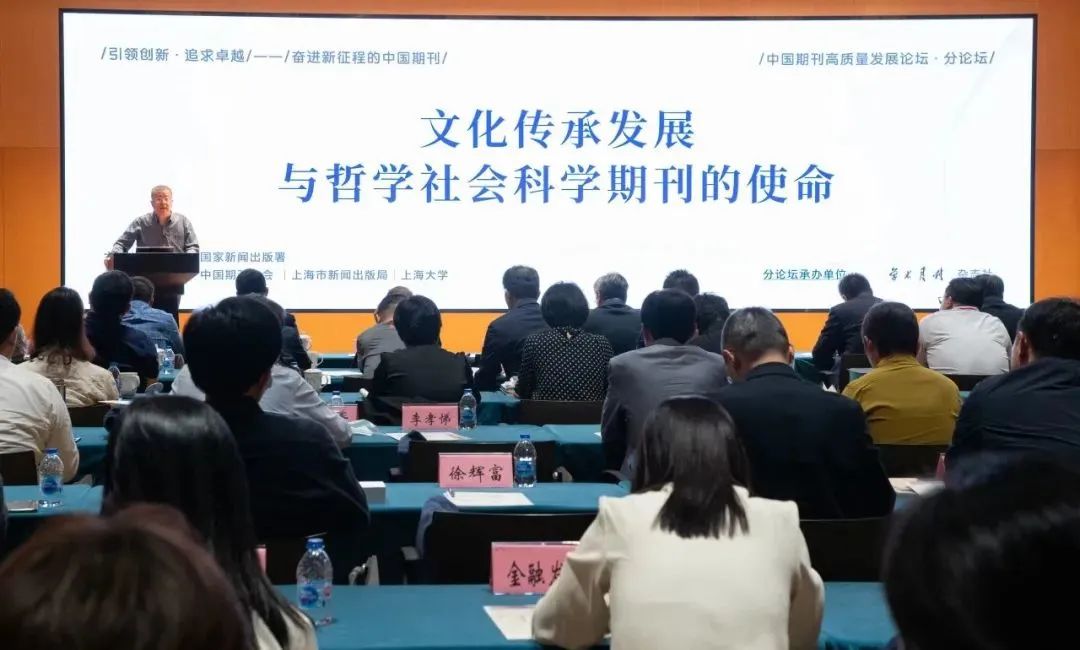Cultural Inheritance and Development and the Mission of Philosophical and Social Science Journals, a Sub-forum of the China Forum on High-Quality Development of Journals, Convened

On the afternoon of 27th October, Cultural Inheritance and Development and the Mission of Philosophical and Social Science Journals, a sub-forum of the China Forum on High-Quality Development of Journals, was convened in the Shanghai Social Science Hall. It was hosted by the National Press and Publication Administration and was organized by the Office of Academic Monthly. About one hundred participants, including representatives of journals based in and outside Shanghai, scholars, and media, attended the event.

Research Fellow Xiong Yuezhi, Former Vice President of the Shanghai Academy of Social Sciences, emphasized that the pursuit of self-improvement has always been of paramount importance in Chinese excellent traditional culture. This pursuit embodies subjectivity, willpower, perseverance, and introspection. By organically integrating such a traditional native value with Marxism, it is possible to imbue it with new connotations and inject fresh impetus. Moreover, such integration can serve as a crucial spiritual foundation for successfully managing academic journals.
Research Fellow Qin Kaifeng, Editor-in-chief of the Journal of Humanities of the Shaanxi Academy of Social Sciences, asserted that the scientific spirit inherently embedded in the Chinese glorious traditional culture provides the fundamental strength for the construction of our cultural subjectivity. Beyond its role in academic dissemination, journals also undertake the more critical task of generating original knowledge locally. To inherit and develop Chinese culture, academic journals must prioritize its task in enabling original knowledge production and knowledge growth.
Kong Lingmei, Deputy Director of the Editorial Department of Dunhuang Research based at the Dunhuang Research Institute in Gansu Province, shared insights on how Dunhuang Research contributed to the construction of a disciplinary system of Dunhuang studies with Chinese characteristics and Chinese magnitude. The discussion also extended to how Chinese academic research can drive the global development of Dunhuang studies, so as to tell compelling stories about Dunhuang on the international stage and spread the voice of China worldwide.
Prof. Chen Heng, Vice President of Shanghai Normal University, pointed out that academic journals should adhere to “Two Combinations” in order to respond positively to modernization and internationalization, and to shoulder the mission and responsibility of inheriting and developing Chinese culture. Efforts should be made to combine the experience of both foreign and domestic journals. Leveraging academic journals as important catalysts and platforms will continue to elevate the representation and proportion of Chinese scholarship in contemporary global knowledge and academic fields, at the same time as we expand the overall global capacity for knowledge production.
Prof. Wang Yonghao, Editor-in-Chief of Fudan Journal, said that Chinese civilization is an open system formed through continuous exchanges and mutual learning with other civilizations. Given that the world is increasingly turning its attention to China, and that academia is an important window for it to further understand China, high-quality academic journals should strive to promote Sino-foreign academic exchanges and innovate Chinese scholarship by means of learning from other cultures.
Prof. Liu Shuguang, Executive Deputy Editor-in-Chief of the Journal of Peking University, observed that academic journals should push for more organized scientific research, as, in this way, they might fulfill their role as leaders and service providers in academic production, expediting the construction of an independent knowledge system in China. Implementing new editorial concepts, establishing a new pattern for journal development, and promoting high-quality development of journals are essential for serving the construction of world-class universities and superior academic disciplines with Chinese characteristics.

